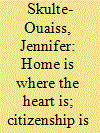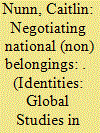| Srl | Item |
| 1 |
ID:
162779


|
|
|
|
|
| Summary/Abstract |
Since Kazakhstan became an independent state in 1991 the state apparatus has pursued various processes of nation-building intended to establish a cohesive civic identity among the multiethnic population of the state. We assess the interplay between the civic nation building policies of the Kazakhstani state since the early 2000s and ordinary Kazakhstanis through media analysis and ethnographic interviews. We find that, while Kazakhstan’s official civic nation-building policies shape how Kazakhstanis perceive their attachment to the state, there remains no widespread evidence of the decoupling of ethnicity from nationality as suggested by official rhetoric. Ethnonational identity remains salient in Kazakhstan.
|
|
|
|
|
|
|
|
|
|
|
|
|
|
|
|
| 2 |
ID:
165967


|
|
|
|
|
| Summary/Abstract |
Research into post-independence identity shifts among Kazakhstan’s Russian-speaking minorities has outlined a number of possible pathways, such as diasporization, integrated national minority status and ethnic separatism. Drawing on semi-structured interviews with young people in Almaty and Karaganda, I examine how Russian-speaking minorities identify with the state and imagine their place in a ‘soft’ or ‘hybrid’ post-Soviet authoritarian system. What is found is that Russian-speaking minorities largely accept their status beneath the Kazakh ‘elder brother’ and do not wish to identify as a ‘national minority’. Furthermore, they affirm passive loyalty to the political status quo while remaining disinterested in political representation. Russian-speaking minorities are also ambivalent towards Kazakh language promotion and anxious about the increasing presence of Kazakh-speakers in urban spaces. This article argues that two factors are central to these stances among Kazakhstan’s Russian-speaking minorities: the persistence of Soviet legacies and the effects of state discourse and policy since 1991.
|
|
|
|
|
|
|
|
|
|
|
|
|
|
|
|
| 3 |
ID:
119384


|
|
|
|
|
| Publication |
2013.
|
| Summary/Abstract |
In a country with a history of conflict, Lebanese not only have long sought emigration as a means of improving their safety and prosperity but also have sought out second passports as 'safeguards' to be used when things got rough at home. Little has been done on how Lebanese view these 'second passports' and the actual citizenship that comes with them. This article seeks to tackle this topic through analysing interviews of 10 Lebanese citizens who also hold European citizenship through naturalisation. How these Lebanese view their European citizenships will be described before turning to discussion of how this may affect the understandings of citizenship in Europe. The article concludes by looking on how the understandings of citizenship in liberal democracies in Europe on the part of citizens who normally reside outside of the state and who obtain citizenship as a 'safety' option may affect the broader understandings of citizenship in these countries.
|
|
|
|
|
|
|
|
|
|
|
|
|
|
|
|
| 4 |
ID:
152446


|
|
|
|
|
| Summary/Abstract |
Many immigrant-receiving countries are characterised by increasing multigenerational ethnocultural diversity, with associated policies and discourses of inclusion. Yet they often simultaneously resist relinquishing narratives and practices grounded in idealised notions of ethnocultural homogeneity. This results in the circulation of multiple, often competing, ideas of the nation, with significant implications for national (non)belonging among migrants and their descendants. Based on interviews with members of seven Vietnamese Australian families, this article explores their discursive navigation of two competing ideas of Australia: as ethnocultural and multicultural. Applying a conceptual framework of belonging that attends to the relation between the personal and the political, this article demonstrates that, for migrants and their descendants, national (non)belonging is a dynamic and dialogic process of negotiating multiple national spheres, each governed by different politics and offering different possibilities for belonging. The multigenerational interview cohort additionally provides insights into the role of migration generation in mediating this process.
|
|
|
|
|
|
|
|
|
|
|
|
|
|
|
|